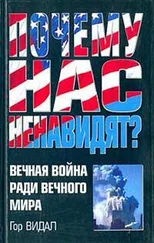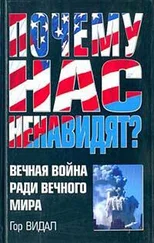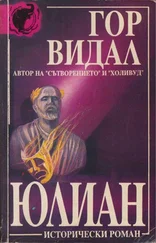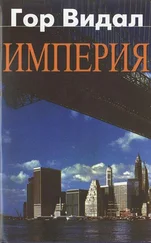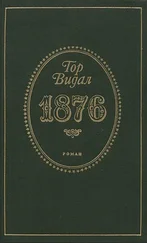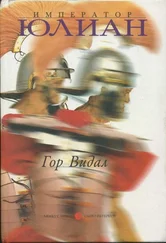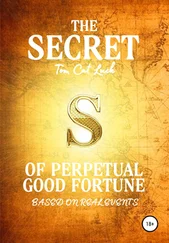Гор Видал - Perpetual War For Perpetual Peace
Здесь есть возможность читать онлайн «Гор Видал - Perpetual War For Perpetual Peace» весь текст электронной книги совершенно бесплатно (целиком полную версию без сокращений). В некоторых случаях можно слушать аудио, скачать через торрент в формате fb2 и присутствует краткое содержание. Жанр: Проза, на английском языке. Описание произведения, (предисловие) а так же отзывы посетителей доступны на портале библиотеки ЛибКат.
- Название:Perpetual War For Perpetual Peace
- Автор:
- Жанр:
- Год:неизвестен
- ISBN:нет данных
- Рейтинг книги:5 / 5. Голосов: 1
-
Избранное:Добавить в избранное
- Отзывы:
-
Ваша оценка:
- 100
- 1
- 2
- 3
- 4
- 5
Perpetual War For Perpetual Peace: краткое содержание, описание и аннотация
Предлагаем к чтению аннотацию, описание, краткое содержание или предисловие (зависит от того, что написал сам автор книги «Perpetual War For Perpetual Peace»). Если вы не нашли необходимую информацию о книге — напишите в комментариях, мы постараемся отыскать её.
Perpetual War For Perpetual Peace — читать онлайн бесплатно полную книгу (весь текст) целиком
Ниже представлен текст книги, разбитый по страницам. Система сохранения места последней прочитанной страницы, позволяет с удобством читать онлайн бесплатно книгу «Perpetual War For Perpetual Peace», без необходимости каждый раз заново искать на чём Вы остановились. Поставьте закладку, и сможете в любой момент перейти на страницу, на которой закончили чтение.
Интервал:
Закладка:
By and large, the Sherman antitrust laws are long since gone. Today three companies control 80 percent of the total beef-packing market. How does this happen? Why do dispossessed farmers have no congressional representatives to turn to? Why do consumers get stuck with mysterious pricings of products that in themselves are inferior to those of an earlier time? Dyer's answer is simple but compelling. Through their lobbyists, the corporate executives who drew up the "adaptive program" for agriculture now own or rent or simply intimidate Congresses and presidents while the courts are presided over by their former lobbyists, an endless supply of white-collar servants since two-thirds of all the lawyers on our small planet are Americans. Finally, the people at large are not represented in government while corporations are, lavishly.
What is to be done? Only one thing will work, in Dyer's view: electoral finance reform. But those who benefit from the present system will never legislate themselves out of power. So towns and villages continue to decay between the Canadian and the Mexican borders, and the dispossessed rural population despairs or rages. Hence, the apocalyptic tone of a number of recent nonreligious works of journalism and analysis that currently record, with fascinated horror, the alienation of group after group within the United States.
Since the Encyclopaedia Britannica is Britannica and not America, it is not surprising that its entry for "Bill of Rights, United States" is a mere column in length, the same as its neighbor on the page "Bill of Sale," obviously a more poignant document to the island compilers. Even so, they do tell us that the roots of our Rights are in Magna Carta and that the genesis of the Bill of Rights that was added as ten amendments to our Constitution in 1791 was largely the handiwork of James Madison, who, in turn, echoed Virginia's 1776 Declaration of Rights. At first, these ten amendments were applicable to American citizens only as citizens of the entire United States and not as Virginians or as New Yorkers, where state laws could take precedence according to "states' rights," as acknowledged in the tenth and last of the original amendments. It was not until 1868 that the Fourteenth Amendment forbade the states to make laws counter to the original bill. Thus every United States person, in his home state, was guaranteed freedom of "speech and press, and the right to assembly and to petition as well as freedom from a national religion." Apparently, it was Charlton Heston who brought the Second Amendment, along with handguns and child-friendly Uzis, down from Mount DeMille. Originally, the right for citizen militias to bear arms was meant to discourage a standing federal or state army and all the mischief that an armed state might cause people who wanted to live not under the shadow of a gun but peaceably on their own atop some sylvan Ruby Ridge.
Currently, the Fourth Amendment is in the process of disintegration, out of "military necessity" — the constitutional language used by Lincoln to wage civil war, suspend habeas corpus, shut down newspapers, and free southern slaves. The Fourth Amendment guarantees "the right of the people to be secure in their persons, houses, papers, and effects, against unreasonable searches and seizures. and no Warrants shall issue, but upon probable cause, supported by Oath or affirmation, and particularly describing the place to be searched, and the persons or things to be seized." The Fourth is the people's principal defense against totalitarian government; it is a defense that is now daily breached both by deed and law.
In James Bovard's 1994 book, Lost Rights , the author has assembled a great deal of material on just what our law enforcers are up to in the never-to-be-won wars against Drugs and Terrorism, as they do daily battle with the American people in their homes and cars, on buses and planes, indeed, wherever they can get at them, by hook or by crook or by sting. Military necessity is a bit too highbrow a concept for today's federal and local officials to justify their midnight smashing-in of doors, usually without warning or warrant, in order to terrorize the unlucky residents. [*]These unlawful attacks and seizures are often justified by the possible existence of a flush toilet on the fingered premises. (If the warriors against drugs don't take drug fiends absolutely by surprise, the fiends will flush away the evidence.) This is intolerable for those eager to keep us sin-free and obedient. So in the great sign of Sir Thomas Crapper's homely invention, they suspend the Fourth, and conquer.
[ *Happily, for them, the "long war" has been declared by our Enron-Pentagon president and we are under metastasizing martial law.]
Nineteen ninety-two. Bridgeport, Connecticut. The Hartford Courant reported that the local Tactical Narcotics Team routinely devastated homes and businesses they "searched." Plainclothes policemen burst in on a Jamaican grocer and restaurant owner with the cheery cry "Stick up, niggers. Don't move." Shelves were swept clear. Merchandise ruined. "They never identified themselves as police," the Courant noted. Although they found nothing but a registered gun, the owner was arrested and charged with "interfering with an arrest" and so booked. A judge later dismissed the case. Bovard reports, "In 1991, in Garland, Texas, police dressed in black and wearing black ski-masks burst into a trailer, waved guns in the air and kicked down the bedroom door where Kenneth Baulch had been sleeping next to his seventeen-month-old son. A policeman claimed that Baulch posed a deadly threat because he held an ashtray in his left hand, which explained why he shot Baulch in the back and killed him. (A police internal investigation found no wrongdoing by the officer.) In March 1992, a police SWAT team killed Robin Pratt, an Everett, Washington, mother, in a no-knock raid carrying out an arrest warrant for her husband. (Her husband was later released after the allegations upon which the arrest warrant were based turned out to be false.)" Incidentally, this KGB tactic — hold someone for a crime, but let him off if he then names someone else for a bigger crime — often leads to false, even random allegations that ought not to be acted upon so murderously without a bit of homework first. The Seattle Times describes Robin Pratt's last moments. She was with her six-year-old daughter and five-year-old niece when the police broke in. As the bravest storm trooper, named Aston, approached her, gun drawn, the other police shouted, "'Get down.' and she started to crouch onto her knees. She looked up at Aston and said, 'Please don't hurt my children. ' Aston had his gun pointed at her and fired, shooting her in the neck. According to [the Pratt family attorney John] Muenster, she was alive another one to two minutes but could not speak because her throat had been destroyed by the bullet. She was handcuffed, lying face down." Doubtless Aston was fearful of a divine resurrection; and vengeance. It is no secret that American police rarely observe the laws of the land when out wilding with each other, and as any candid criminal judge will tell you, perjury is often their native tongue in court.
The IRS has been under some scrutiny lately for violations not only of the Fourth but of the Fifth Amendment. The Fifth requires a grand-jury indictment in prosecutions for major crimes. It also provides that no person shall be compelled to testify against himself, forbids the taking of life, liberty, or property without due process of law, or the taking of private property for public use without compensation.
Over the years, however, the ever secretive IRS has been seizing property right and left without so much as a postcard to the nearest grand jury, while due process of law is not even a concept in their single-minded pursuit of loot. Bovard notes:
Читать дальшеИнтервал:
Закладка:
Похожие книги на «Perpetual War For Perpetual Peace»
Представляем Вашему вниманию похожие книги на «Perpetual War For Perpetual Peace» списком для выбора. Мы отобрали схожую по названию и смыслу литературу в надежде предоставить читателям больше вариантов отыскать новые, интересные, ещё непрочитанные произведения.
Обсуждение, отзывы о книге «Perpetual War For Perpetual Peace» и просто собственные мнения читателей. Оставьте ваши комментарии, напишите, что Вы думаете о произведении, его смысле или главных героях. Укажите что конкретно понравилось, а что нет, и почему Вы так считаете.


